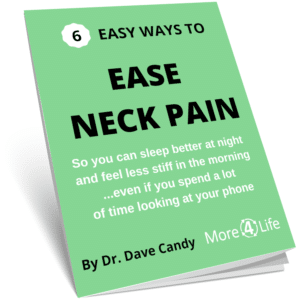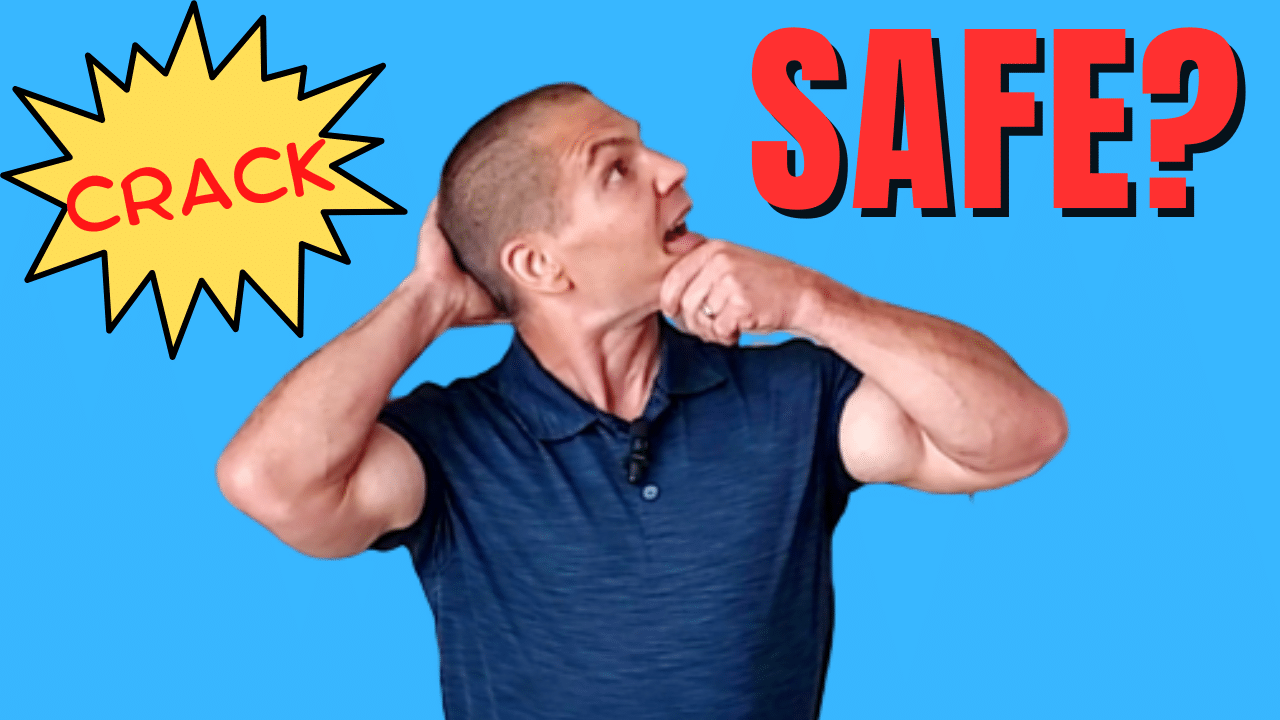Is It BAD To Crack Your Neck?
If you're asking that question, chances are that you're already cracking your own neck and you're concerned about whether it's safe to continue doing it.
There's nothing inherently bad about cracking your neck. However, there are some considerable safety concerns that you do want to keep in mind.
As a fellowship-trained orthopedic manual physical therapist, I have a lot of training in doing hands-on techniques, such as spinal manipulation.
Additionally though, I have training in when to do them, and even more importantly, when NOT to do them.
Because there are some very serious consequences that can come from either cracking your own neck or having someone else crack your neck, up to and including death.
So, you really want to make sure that you've ruled out a lot of safety factors before considering cracking your neck... either cracking your own neck or having someone else do it.
Watch this video to learn when it could be dangerous to crack your neck, who might benefit from cracking their neck, and how to crack your neck safely, keeping in mind that the absolute most safest way to do it is not to do it at all.

When Is Cracking Your Neck Dangerous?
First of all, who absolutely should not get their neck manipulated?
If you've got osteopenia or osteoporosis where your bone strength isn't good, you definitely don't want to be cracking your own neck or having someone else do it.
Additionally, if you've got hypermobility disorders such as Ehlers-Danlos syndrome or Down syndrome, where your ligaments are extra stretchy, you probably don't want to manipulate your own neck or have someone else do it. That's because there's a chance that things could slip and injure your spinal cord or the arteries that go up to your brain.
So, you don't want to crack your neck in those cases.
Cranial Nerve Symptoms
There are some other symptoms that may make you wary about cracking your neck or having someone else crack your neck.
Those are cranial nerve signs, meaning signs that your brain stem has been compromised.
Those symptoms include:
- dizziness
- nausea
- vomiting
- double vision
- trouble speaking or swallowing
- numbness in your face or, to some extent, in your legs
- ringing in your ears (tinnitus)
- falling for no reason (drop attacks)
- a severe headache unlike any other that you've had before
...or any other symptom besides just neck pain that you feel is strange or unusual.
If you have any of these, consider having your neck checked out medically before cracking your neck.
Other Safety Considerations Regarding Cracking Your Neck
Another safety consideration is that a very early sign of a stroke can be either neck pain or a headache, particularly "a headache unlike any other that I've had before."
I you're not used to having headaches or you're having a really just severe pounding headache that's unlike any other headache that you've had before, you probably want to be wary of cracking your neck.
Keep in mind though, the main reason that people have their neck manipulated - either by a chiropractor or a physical therapist or doing it themselves - is because of neck pain or headache.
So keep in mind that there are some adverse effects of cracking you neck that cannot be predicted. There's always some inherent risk.
Who's Most Likely To Benefit From Cracking Their Neck?
There was actually a clinical prediction rule developed to predict people who are most likely to benefit from having their neck manipulated in a clinical setting. (Puentedura, et al 2012)
But some of those same principles can likely apply to people who are thinking about cracking their own neck.
The four factors in the cervical manipulation clinical prediction rule are:
- duration of symptoms less than 38 days
- having at least a 10 degree side-to-side difference in how far they can turn their neck
- a segment in the neck that's tender when applying pressure to it
- a belief that spinal manipulation is going to be helpful
Keep in mind, those were derived by research, but this is not a validated rule... meaning it hasn't been tested in a second study.
But it does give some indication of what factors may indicate success with spinal manipulation.
Looking at the big picture principles, those things are recent onset, localized pain with a defined area of tenderness, that there's some loss of range of motion, and that you think cracking your neck is going to be helpful.
How does this apply to cracking your own neck?
So, for example, let's say you wake up in the morning and your neck is stiff. You're having trouble turning it, particularly more one way than the other. You feel that there's an area that's kind of sore to touch, and you think, "If I could just get that to pop, then it would probably feel a whole lot better."
That's an example of a time when having your neck manipulated in a clinical setting may be helpful.
If you're able to safely crack your own neck, then that may be a time when it could be helpful.
However, if you wake up every day for six weeks or more and you feel like every morning you wake up, you have to crack your neck, there's likely something else going on that's making your neck continue to lock up.
When you look at studies of adverse effects after spinal manipulation, when really bad things happen, it's usually not on the first treatment.
It's often continued spinal manipulation when things haven't been improving.
So, it's unlikely that there's going to be damage the first time, but it can still happen.
However, if you continue to crack your neck over long periods of time and it's not helping to improve your pain, then it's probably time to stop.
Now, all that being said, if you've got a high likelihood of benefiting from spinal manipulation and a low risk of harm, what's the safest way to crack your own neck?
How To Crack Your Neck Safely
Again, the absolute safest way to crack your neck is not to do it at all.
However, if you are going to do it, then the way that's safest to do it is to do it without using your hands and just doing it in normal, physiological ranges of motion.
To be safe, you have to be okay with the fact that your neck might not pop. Don't force it!
If you can just kind of tilt your head one way or the other and it pops, then that's okay to do.
In fact, a lot of people may hear a cracking or cracking or grinding noise when turning their head without meaning it to happen.
It's fairly common to get popping sounds in your neck, and they're usually not harmful.
So if you can position your head, usually in side bending to one side and rotation to another, within a normal range of motion, that's a reasonably safe way to pop your neck. Again, the safest way is just not to do it at all.
If you have to really twist your neck fast to do it or grab your chin and contort your neck, that is unsafe.
I wouldn't advocate doing that under any circumstance.
Conclusion
So largely, if you're thinking about either cracking your own neck or seeing someone like a chiropractor or a physical therapist to have your neck cracked, you want to make sure that:
- You're a good candidate for improving
- You don't have a high likelihood of being harmed.
- If you're going to do it yourself, just do it in normal physiological ranges of motion without having to whip your head around fast or use your hands.
Hopefully this article gave you more clarity about if it is bad to crack your neck.
Should You See A Chiropractor Or A Physical Therapist To Crack Your Neck?
Now, if you do need some help for neck pain and you'd like to find out if you're a good candidate for spinal manipulation, I would recommend seeing an orthopedic manual physical therapist.
The reason for that is that if you see a chiropractor, it's very likely that you will get your neck cracked.
That's nothing against chiropractors...
It's just that spinal manipulation is their main tool.
On the other hand, if you see a physical therapist that's not trained in spinal manipulation, it's very unlikely that you'll get your neck popped, even if you might be a good candidate for it.
However, a fellowship-trained orthopedic manual physical therapist has the understanding of how to crack your neck safely, the skill to do it when it's necessary, and also the understanding of when not to do it because it might be unsafe.
If you're in the St. Louis area, our orthopedic manual physical therapists here at More 4 Life would be happy to help you. Just tap the button below to request an appointment.


